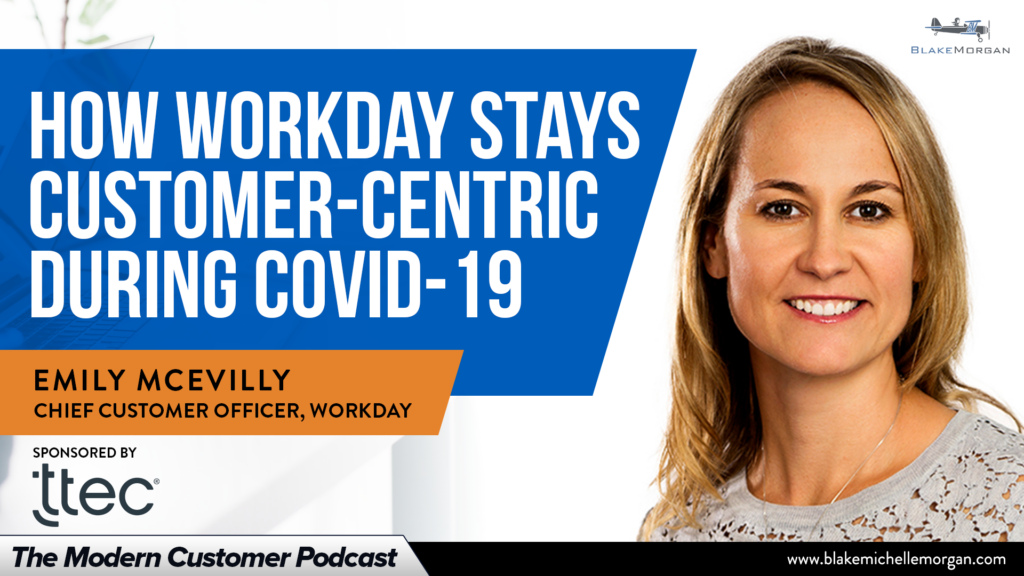The COVID-19 pandemic rocked companies and customers around the world. As businesses struggled to survive, many put focusing on their customers on the backburner.
But that’s not the case for Workday. The software company is regularly ranked one of the best companies in the world for its customer service and boasts an impressive 97% customer satisfaction score. As the world fell into chaos, Workday stayed close to its customers and used the crisis as a chance to strengthen relationships.
Emily McEvilly is Workday’s first-ever Chief Customer Officer. She views her role to be the chief customer advocate and ensure that the customers’ voice is present in everything the company does. Never has that been more important than during the global pandemic. McEvilly said Workday was faced with three main waves of COVID-19 response. The first wave was when stay-at-home orders were first issued. As companies tried to wrap their heads around working from home, Workday B2B clients were mainly focused on business continuity and keeping things moving forward.
The second wave came later as companies and employees found a groove of working from home. They had managed to stay afloat, but now faced the challenges of adapting potentially long term. Workday continued its standard personalized approach to customer service but tailored it to meet the many needs of its clients. Employees known as Customer Success Managers were assigned to groups of customers to develop strong relationships with them. Those employees serve as a point of contact for customers and use their knowledge of each customer to offer personalized service. Instead of customers having to blindly call customer service, they have a single person they can contact directly to meet their needs.
Workday covers clients in nearly every industry around the globe, and the different needs of those companies became clear during COVID-19. A one-size-fits-all response to the pandemic wouldn’t work with the differing situations. Instead, Workday divided its employees to each serve certain customers. During a crisis, speed is of the essence, and pre-assigning employees cut down on customers having to wade through red tape to find the right person to help them.
McEvilly shared the example of one large U.S. retailer that wanted to give its front-line workers an hourly increase. Workday’s customer-centric response helped the company quickly make the change to best help its employees. Another much smaller company has a different type of global workforce that wasn’t used to working from home. Workday employees updated the client’s software to allow managers to easily track employee tasks and even provided consulting hours to help them make changes in their apps. Going one step further, Workday shared the experience in its customer portal so that any customer could see how the product could be tailored.
According to McEvilly, the third phase of COVID-19 response hasn’t yet arrived. That will be when companies get back to working in person or with a long-term remote work strategy. In preparation for that phase, Workday is already building new partnerships to strengthen its products to deliver agile features customers will need.
Like with many other companies, COVID-19 pushed Workday to implement digital programs earlier than originally planned. Workday accelerated the launch of its Digital Customer Experience, which optimizes all systems related to Workday applications. The applications themselves are powerful and efficient, but the programs that support the applications and educate customers needed to be refined. The digital approach is improving how customers search for information and learn about their Workday products to get the most value.
Customer-centricity is never more important than during a crisis. The COVID-19 pandemic shows that customers crave connection and want personalized service to keep moving forward. By offering personalized, digital solutions, Workday is able to keep its customers central to everything it does, no matter what is happening in the world.
This week’s podcast is sponsored by TTEC.
Imagine an interaction that’s so simple and easy, that you don’t even think about it!
TTEC calls this ‘mastering the effortless experience’… and it’s the future of CX.
When your competition is just a click away, how do you ensure your customers stay loyal? How do you keep your employees engaged and motivated? How do you make sure your brand thrives?
Managing over 3.5 million interactions daily, TTEC are CX experts who know what it takes to deliver amazing and effortless customer experiences. They combine CX strategy with proven-processes, award-winning people engagement and best-of-breed technology to deliver holistic solutions focused on driving real-world results for their clients every day.
Don’t get lost in a sea of competitors. Effortless is not a destination. It’s a journey. And TTEC can be your guide to an effortless future.
To find out more about how TTEC can help you transform your customer experience visit TTECDigital.com.
Blake Morgan is a customer experience futurist, keynote speaker and the author of the bestselling book The Customer Of The Future. Sign up for her weekly newsletter here.

